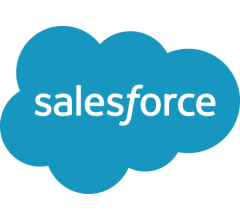Pricing, Alternatives, Pros & Cons
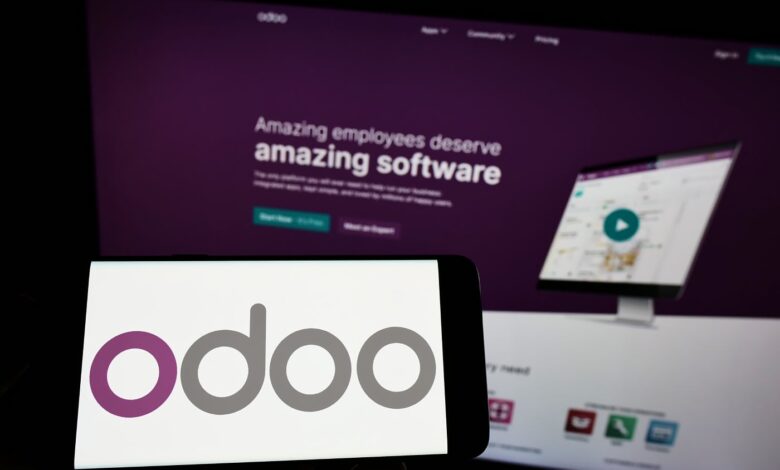
Odoo CRM’s fast factsOur star rating: 4.08/5 Pricing: Free for one app; starts at $31.10 per user per month billed annually Key features:
|
Odoo CRM is an open-source customer relationship management platform with robust tools for lead scoring and tracking, sales forecasting and activity tracking. Odoo CRM’s cloud or self-hosted version is free, making it ideal for multi-location organizations that need a cost-effective solution without local installation.
While Odoo CRM is free, paid subscriptions unlock functionalities, such as accounting and sales. Plus, it’s exclusive to other Odoo apps, which can be limiting for companies that already have systems in place.
Odoo pricing
Odoo CRM is free if you only use its app alone. An additional app will automatically be a paid premium. You can try any app for free for 15 days before needing to upgrade to a paid plan.
Odoo has two paid plans, billable monthly or yearly:
- Standard: $31.10 per user, per month, billed annually; or $38.90 per user, per month; unlimited apps in the cloud (self-hosted).
- Custom: $46.70 per user, per month, billed annually; or $58.40 per user, per month; unlimited apps in the cloud and on-premises.
The main difference between the paid plans is the ability to host Odoo on your premises and build custom modules under the Custom plan.
For the first year of subscription, Odoo offers a discount with the following prices:
- Standard: 24.90 per user, per month, billed annually; or $31.10 per user, per month.
- Custom: $37.40 per user, per month, billed annually; or $46.80 per user, per month.
SEE: Read our in-depth Odoo review to learn more about its platform and pricing.
Key features of Odoo CRM
Smart automation
Organizations can set up smart automated actions in their dashboards to enable triggers based on specific conditions. Routine tasks can be automated (Figure A), such as updating the status of leads or sending follow-up emails.
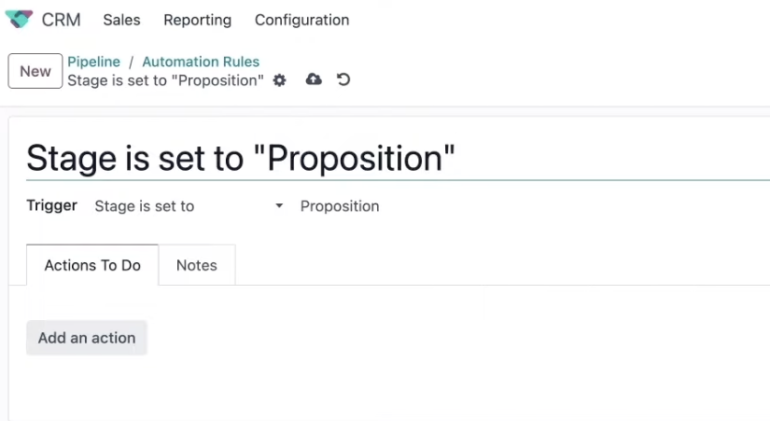
Predictive lead scoring and segmentation
Odoo CRM lets organizations assign leads based on the probability of a conversion. Predictive lead scoring is based on historical data from open leads or opportunities but can be customized in the settings (Figure B) based on phone and email quality. This is not present in most open-source CRM platforms I have reviewed.
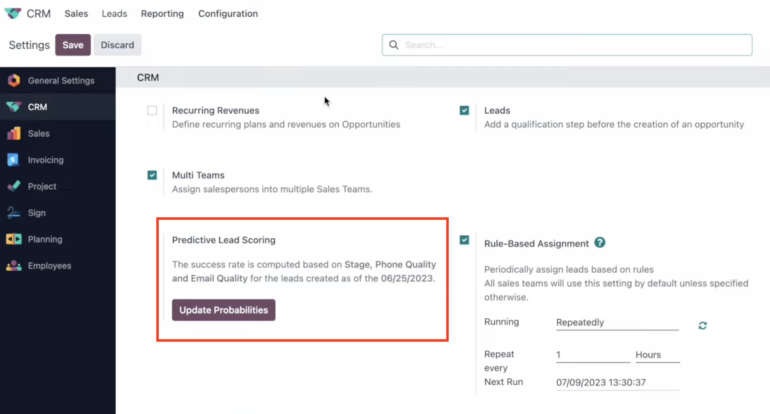
Lead generation from social media
Odoo CRM enables the addition of social media accounts as streams in a user’s main dashboard. Once a stream is added, social posts can be seen on the platform, and clicking on a comment on any social post can be created as a lead (Figure C). This feature is part of the free plan of Odoo CRM, which is considered a premium feature (paid add-on) with other top CRM platforms.

SEE: Know what a social CRM is and why it should be on your radar.
Self-service customer portal
Odoo CRM provides a customer portal where customers can access relevant data and communicate with the organization. Companies can also request signatures (Figure D) and documents from the platform. This feature is not always present in other CRM applications.
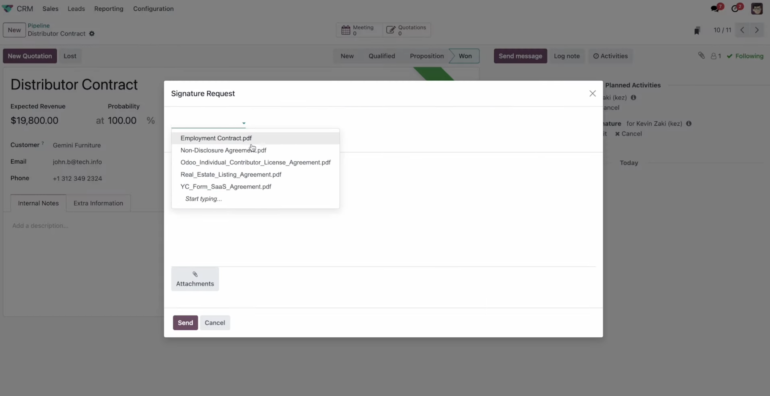
Odoo CRM Pros
Intuitive user interface
I signed up for a free plan to explore and test Odoo CRM’s interface and features. I found its dashboard intuitive, and it was easy to navigate between features. Its pipeline management view provides an easy-to-digest view with an in-depth section when you click on each contact. User reviews on third-party websites have shared the same sentiment.
Robust lead and pipeline management features
Odoo CRM allows users to identify leads that are primed for sales. In the pipeline view, users can also see customer details and activities right away.
Extensive community resources and tutorials
There is a wealth of community resources available for Odoo CRM. Odoo provides its documentation and has an active community of users in its forum. Plenty of tutorials about the software are available online.
Odoo CRM Cons
Free plan limited to one app
While Odoo CRM is technically free, you are only allowed to use one app under a free plan. If you need extra features such as accounting, sales automation and project management, you would need a paid plan.
Integrations are exclusive to Odoo apps
Odoo CRM is limited to other Odoo apps for integrations. While Odoo apps are extensive (72 apps as of this writing), they are nothing compared to other CRM software, which have hundreds of third-party integrations available.
Steep learning curve and poor support
As an open-source CRM, Odoo CRM is expected to have a slight learning curve. However, real-world user feedback from third-party sites mentions challenges with initial configuration and the lack of helpful support from its customer support team, even with availing of the Success Packs (customization paid packages) and premium support plans.
Alternatives to Odoo CRM
While Odoo CRM allows for unlimited customization, it may not be suitable for organizations that lack the know-how to configure individual features. Additionally, Odoo CRM can only be integrated with other Odoo applications, which can be limiting.
As such, there are other top CRM software for small businesses like Freshsales and those that offer free limited versions of its robust features, such as HubSpot CRM. SuiteCRM, our top pick for open-source CRM software, can also be a good alternative.
| Software | Odoo CRM | Freshsales | Hubspot CRM | SuiteCRM |
|---|---|---|---|---|
| Predictive lead scoring and segmentation | Yes | Yes | No | Yes, but as an add-on |
| Workflow automations | Yes | Yes, paid tiers only | Yes | Yes |
| AI-powered features | Yes | Yes | Yes | No |
| Mobile-friendly | Yes | Yes | Yes | Yes |
| Free tier | Yes | Yes | Yes | Yes |
| Starting price* | $8.95 per user per month | $9 per user per month | $20 per user per month | £100 ($126.45) per month |
* Pricing is based on annual billing subscriptions.
Freshsales

Freshsales enables businesses to collaborate seamlessly between sales, marketing and support departments. Its biggest strength is its AI-powered tools, which let businesses create custom pipelines. For example, its Freddy AI tool runs campaigns that generate, qualify, segment and track incoming leads.
SEE: For a full breakdown, check out our independent review of Freshsales.
HubSpot CRM

While HubSpot CRM is not open-source, it provides free, robust tools and developer-friendly integrations for up to 2,500 users. Its custom pipelines and activity tracking provide room for scaling to fit any company’s sales and customer management needs. However, note that there is limited customization compared to Odoo CRM.
SEE: Read our complete review of HubSpot CRM for a full breakdown of its offerings.
SuiteCRM

Similar to Odoo CRM, SuiteCRM’s all-in-one open-source platform supports customizable features such as case management and workflows. However, unlike Odoo CRM, which only allows cloud or self-hosting options on the free plan unless you upgrade to the paid tier, SuiteCRM offers both downloadable and cloud-hosted options.
SEE: For more information, check out this complete review of SuiteCRM.
Review methodology
To evaluate the software, I signed up for a free plan, referred to online resources, considered real user feedback and watched online video tutorials. I also utilized our in-house rubric to come up with a quantitative score on how Odoo CRM compares to other CRM software. Our rubric evaluates key features of the best CRM software for businesses, such as cost, core features, customizations, integrations, ease of use and customer support.
The following is the breakdown of the criteria used to score Odoo CRM:
- Cost: Weighted 25% of the total score.
- Core features: Weighted 25% of the total score.
- Advanced offerings: Weighted 20% of the total score.
- Customer support: Weighted 10% of the total score.
- Technology features: Weighted 10% of the total score.
- Reporting and analytics: Weighted 10% of the total score.



